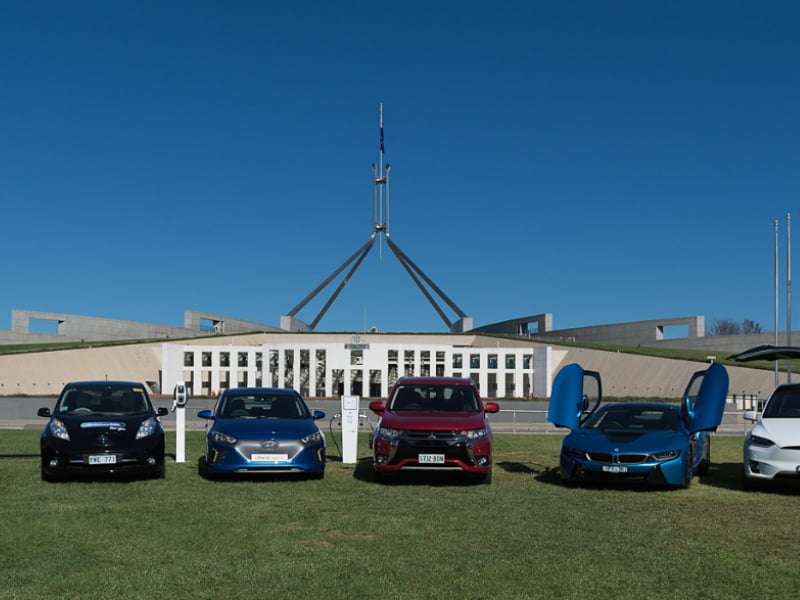Australia is on the “precipice” of an electric vehicle boom, but the federal government needs to change its policy settings to take advantage of the momentum, with sales nearly tripling in the last year, according to the peak industry body.
The Electric Vehicle Council (EVC) says the sale of plug-in electric vehicles increased by 13,755 between 2020-21, with EVs now accounting for 1.95 per cent of new vehicle market share, up from just 0.78 per cent in 2020.
EVC chief executive Behyad Jafari said that the figures show that Australia is “at the precipice of an EV economic boom”, but better federal support is needed.
The jump in sales in recent years is thanks to state government policies, Mr Jafari said.

“Governments that take the path of encouragement will capture myriad societal benefits – cleaner air, reduced respiratory illness, smaller carbon footprint, quieter roads. Those that lag will make themselves a dumping ground for old tech, dirty vehicles,” Mr Jafari said.
“It’s great that some state governments have received the global message, but at a national level we’re stuck in the past. We desperately need the federal government to introduce Australian EV rebates alongside fuel efficiency standards, just like other developed nations. If we get these changes, you’ll see sales figures really rocket ahead.
“As a wealthy, car-loving, early-adopting nation, Australia should be an electric vehicle leader. If we were, we could restart a thriving manufacturing industry supporting thousands of quality jobs. But we need to build rapidly on this current momentum.”
The EVC has access to Tesla’s official sales figures, which confirm that the Tesla Model 3 was the most popular EV model in 2021, accounting for over 60 per cent of EV sales. The second best-selling EV, the MG ZS, accounted for just under 6 per cent of sales.
In November last year Prime Minister Scott Morrison launched the nation’s Future Fuels and Vehicles Strategy, including $178 million in funding for vehicle charging stations and infrastructure.
It also included an expectation that 30 per cent of new car sales in 2030 be electric. At the time, Mr Jafari told InnovationAus that the policy one addresses “about 5 per cent of what needs to happen to support EVs”.
The ACT government currently has the most financial incentives for the purchase of EVs. These include stamp duty exemption, two years of free registration, and zero-interest loans up to $15,000.
The Victorian and NSW governments have both set a target of at least half of vehicle sales to be zero emissions by 2030 and are offering $3,000 subsidies and rebates for vehicles sold under $69,000 respectively.
In Victoria, 20,000 subsidies were made available in total whereas in NSW there were 25,000 available rebates. The NSW strategy also includes a stamp-duty phase out and the delay of a planned road user tax for EV drivers.
A report released by the Grattan Institute in July last year found Australian governments had a “significant opportunity” to accelerate the uptake of EVs and should end the sales of diesel vehicles by 2035.
“Relying on technology and market forces alone won’t be enough to get on track for net zero by 2050,” the report said.
There is still time for Australia to get back in the pack, Mr Jafari said.
“After so many wasted years, Australia’s a long way back from the pack, but then again the cool thing about electric cars is how quickly they move from zero to a hundred,” he said.
Editor’s note: This story originally included incorrect 2021 sales figures provided to the Electric Vehicles Council by Tesla, which included sales from 2020 and 2021. The story has been updated with the correct 2021 figures.
Do you know more? Contact James Riley via Email.


If that $3,000 subsidy could be applied to EV conversions, that might be enough to buy our driveline, for orig minis & mokes, & poss also for trad VWs. (driveline only, not inc motor, batteries, controller.
Asked the Electric Vehicle Council if they could lend me an engineer for ten minutes to verify (or otherwise) my one moving part EV driveline (& 2 moving part EV 4WD)
No reply.
The EV Council today issued a statement correcting these numbers as they were inflated by almost 17% or 3,000 cars. Given Tesla do not officially report sales like the majority of car companies operating in Australia, I would be very careful in believing any EV sales numbers from anyone.